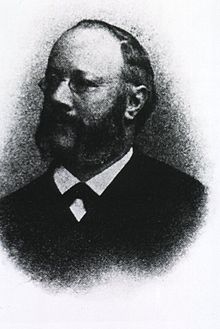Max Jaffé
| Max Jaffe | |
|---|---|
 |
|
| Born | 25 July 1841 Grünberg, Silesia |
| Died | October 26, 1911 (aged 70) Berlin, Germany |
| Nationality | German |
| Fields | Biochemistry, Pathology, Pharmacology |
| Institutions | University of Königsberg |
| Alma mater | University of Berlin |
| Known for | Jaffe reaction of creatinine and picric acid—the oldest clinical methodology still in use. |
The Jaffe reaction is a colorimetric method used in clinical chemistry to determine creatinine levels in blood and urine. In 1886, Max Jaffe (1841–1911) wrote about its basic principles in the paper Über den Niederschlag, welchen Pikrinsäure in normalem Harn erzeugt und über eine neue Reaction des Kreatinins in which he described the properties of creatinine and picric acid in an alkaline solution. The color change that occurred was directly proportional to the concentration of creatinine, however he also noted that several other organic compounds induced similar reactions. In the early 20th century, Otto Folin adapted Jaffe's research into a clinical procedure. The Jaffe reaction, despite its nonspecificity for creatinine, is still widely employed as the method of choice for creatinine testing due to its speed, adaptability in automated analysis, and cost-effectiveness, and is the oldest methodology continued to be used in the medical laboratory. It is this nonspecificity that has motivated the development of new reference methods for creatinine analysis into the 21st century.
Max Jaffe was a distinguished 19th-century German biochemist, pathologist, pharmacologist, and professor. He was born on July 25, 1841, in what was formerly Grünberg, Silesia and is now Zielona Góra, Poland. While attending medical school at the University of Berlin, he studied under Ludwig Traube and Wilhelm Kühne. Afterward, he worked as an assistant in a medical clinic in Königsberg. There, he co-authored a paper on putrid sputum with Ernst Viktor von Leyden that led to the discovery of certain characteristic putrid processes in the lungs. After earning his degree in internal medicine, he served in the Franco-Prussian War and was decorated with the Iron Cross Second Class. The title of Extraordinary Professor of Medicinal Chemistry was awarded to him in 1872 and the following year he became the first Ordinary Professor of Pharmacology at the University of Königsberg. He was promoted to director of the Laboratory for Medical Chemistry and Experimental Pharmacology in 1878 and became a member of the Deutsche Akademie der Naturforscher Leopoldina in 1882. Aside from studying creatinine, he is also known for discovering urobilin and urobilinogen in urine and found that these compounds originated in bile. He died on October 26, 1911 in Berlin and is buried in the Weißensee Cemetery.
...
Wikipedia
